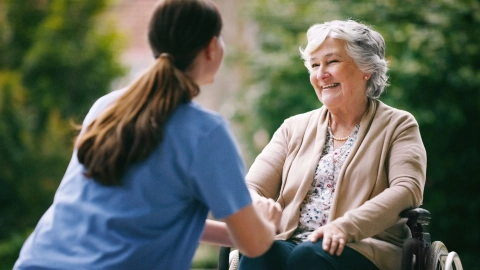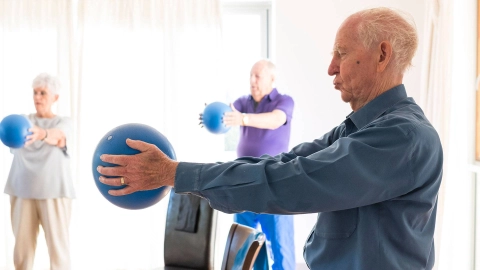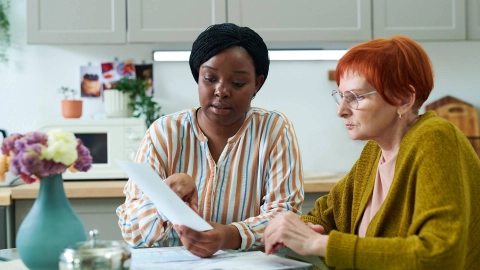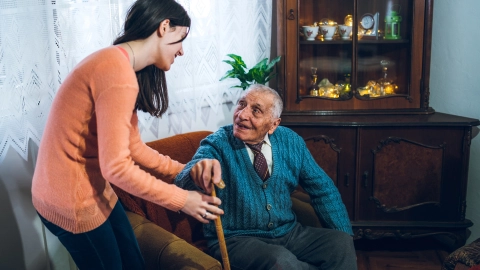Care Mental and physical stress and strain experienced by family caregivers
Acting as a family caregiver, i.e. caring for a loved one at home, can be associated with a great deal of mental and physical stress and strain. This article outlines how family caregivers can recognize the signs of being overwhelmed, avoid burnout and access psychological and practical supports.
At a glance
- Approximately 7.1 million people in Germany care for loved ones at home.
- Being a family caregiver can be very stressful, both mentally and physically. The burden can be particularly great when caring for those with dementia.
- It is important for the caregiver to be able to take breaks from their responsibilities to protect their own health and avoid mental health problems.
- There are several ways to access support and practical help.
Note: The information in this article cannot and should not replace a medical consultation and must not be used for self-diagnosis or treatment.

What causes stress and strain among family caregivers?
In 2023, almost 9 out of every 10 people in need of care in Germany were cared for at home, over half without the assistance of professional care services.
There are family caregivers in all age groups, in different stages of life and who face different types of strain.
In most cases, family caregivers care for elderly people in need of care. Some are also responsible for children and adolescents. Even parents who care for their children in need of care face various challenges.
Many family caregivers are also in gainful employment. However, reconciling care work with a job can be extremely challenging. In some cases, family caregivers have to restrict or even give up gainful employment due to their responsibilities to care recipients.
A significant proportion of family caregivers are themselves already of retirement age – and, in some cases, much older. These people are often highly involved with care-related tasks, for example for a spouse. At the same time, they themselves are confronted with the health challenges of old age.
Even some children and adolescents provide care for family members who are chronically ill or in need of care. This can pose a number of risks to these “young carers”, such as impairing their educational opportunities.
Care is often time-consuming: according to a 2023 survey by the AOK Research Institute (Wissenschaftliches Institut der AOK), the main caregiver spent an average of 49 hours per week providing care. This major time commitment can make it difficult for caregivers to pursue their own needs and interests.
Acting as a caregiver can also be extremely physically demanding due to tasks such as lifting, positioning and supporting the care recipient. In a study from 2018, more than 4 out of every 10 family caregivers reported experiencing back or joint pain. More than one in five family caregivers stated that the care tasks they undertook usually or always affected their physical health.
Providing care can also result in mental strain. Family caregivers can experience feelings of shame, grief, stress, social isolation and helplessness. More than half of the caregivers surveyed showed signs of depression in their self-assessment.
How can you recognize burnout?
Family caregivers should take special care of their own health, both physical and mental. It is important to recognize signs of burnout early on to prevent health problems or even serious illnesses developing from individual instances of stress. It’s easier to care for other people if you’re feeling well yourself.
Pay attention if you detect any of the following signs over a prolonged period:
Physical symptoms
- muscle tension
- headache, back ache, neck pain, jaw pain or shoulder pain
- skin problems
- vulnerability to infections
- cardiovascular symptoms
- weight fluctuations
- stomach and digestive problems
- sleep disorders or unusual tiredness
Psychological symptoms
- nervousness, restlessness or irritability
- memory and concentration problems
- listlessness or restlessness
- mood swings
- helplessness, depression, loneliness, anxiety, anger, sadness
- feelings of worthlessness
- excessive use of medication, tobacco, alcohol and other drugs
These symptoms are possible indicators of burnout, although they may also have other underlying causes. For example, tiredness can be caused by burnout but also by an underactive thyroid.
If you have one or more of these symptoms, consult your family doctor.
What roles are played by stress and support?
Caring for and supporting people in need of care involves a great deal of responsibility and is associated with many emotional, mental, physical and social challenges. These can increase over time and result in caregivers experiencing high levels of stress and feeling overwhelmed – especially if little or no support is available. The risk of burnout ensues, which can also lead to health problems for the family caregiver.
According to a 2023 survey by the AOK Research Institute, one in four caregivers feels under a lot of strain and like they can no longer cope with the care situation.
It is particularly important for caregivers to seek help and support. You can find out what options are available in the section entitled Practical support.
How can family caregivers protect their mental health?
This section summarizes a few strategies that caregivers can use to help them cope better with stress and strain.
Change of perspective – seeing things through the eyes of the care recipient
It can help to look at things from the perspective of the person in need of care, especially if you frequently become impatient, irritated or even angry while providing care.
You could ask yourself the following questions, for example:
- What would I do if I … was thirsty, for example, and couldn’t say so?
- How would I feel if I … needed help with eating, washing or …, for example?
- What would make me happy if I … could no longer easily follow a conversation involving several people, for example?
This change in perspective gives the caregiver a greater understanding of the other person. This improves how the caregiver and the care recipient interact.
Make time for yourself by meeting friends
Friendships are valuable resources. Of course, it is only natural for caregivers to want to tell those they trust about stressful situations encountered while providing care. However, it can also be helpful to set difficulties aside for a while – especially if the person you are speaking to isn’t well equipped to deal with the subject. In this case, talk about things that make you happy instead. It can do you good to forget your problems for a while.
Do something to restore your balance
Some people like to go jogging, others prefer the cinema – try to remember what you like best so that you can remain creative and active. Someone is sure to be able to take over your care tasks so that you can take time for your interests.
Exercise
Regular exercise helps to boost your mental and physical health. This doesn’t need to involve strenuous endurance sports; long walks, yoga sessions and other physical activities several times a week can help increase your mental and physical resilience.
Relaxation
A stressful everyday life can place the body and mind in a continuous state of alarm. Persistent stress can trigger mental and physical issues. Consciously taking time out to relax can help when you notice the first signs of burnout. For example, you could learn a relaxation technique that you specifically incorporate into everyday life.
The article Overcoming crises through resilience provides further tips on how to strengthen your mental resilience.
What to do in an acute crisis
If tension, conflict or negative feelings become too intense, there is a risk of aggressive behavior or even violence. What can you do in such an acute crisis? If possible, leave the situation, if only for a short time.
Concentrate on your breathing. Breathe deeply in and out a few times. Pay attention to what you see, hear and feel in your body. If you can’t calm down, it may help to count slowly and loudly backwards from 10 down to 0. You can even drink a glass of water or a cup of tea consciously and by taking small sips. If you are feeling very stressed or tense, it can help to firmly knead a ball or punch a pillow.
It can also be helpful for you to have one or more people you can contact in this kind of situation. These could be people capable of taking over your caregiving duties in an acute crisis.
The guides published by the Federal working group of senior citizens’ organizations (Bundesarbeitsgemeinschaft der Senioren-Organisationen e.V. (BAGSO) and the Center for Quality in Care (Zentrum für Qualität in der Pflege, ZQP) provide more information about coping strategies.
You can also find information about violence in caregiving settings on the ZQP portal.
From where can family caregivers receive support in the event of mental strain?
There are several options available to caregivers that could help with mental strain.
Sharing experiences with other family caregivers
Feeling understood can help to lift a weight off your shoulders. Other people who care for loved ones have often had similar experiences. They may have a particularly good understanding of your worries, problems and feelings. You can find people with similar experiences in support groups for family caregivers, for example.
The National Contact and Information Point for Self-Help (Nationale Kontakt- und Informationsstelle für Selbsthilfe – NAKOS) provides a nationwide database of family caregiver and support groups in Germany.
Family caregivers face particular challenges when caring for people with dementia. Self-help and family caregiver groups can be found on the website of the German Alzheimer’s Society (Deutsche Alzheimer Gesellschaft e.V.).
Keeping a journal and online advice – relief through writing
It can sometimes help to write down your thoughts and feelings about stressful experiences. In this way, you can get your thoughts in order, establish distance from what you’ve experienced and process your feelings. If you want to find advice for caregivers online, you can write to experienced psychologists for answers to your questions.
This kind of advice is available, for example, from the online psychological advice service pflegen‑und-leben.de provided by the center ÜBERLEBEN gGmbH.
What to do in an acute crisis
Call the TelefonSeelsorge hotline. This provides free 24-hour advice on the numbers 0800 – 111 0 111 or 0800 – 111 0 222.
If you are concerned about becoming aggressive or even violent toward the person you are caring for, please contact a specialized telephone crisis advice service for caregivers.
Children and adolescents who act as caregivers can contact the “Nummer gegen Kummer” helpline for children and adolescents. on 116 111. Lines are open Monday to Saturday, 2 p.m. to 8 p.m.
Not sure if psychotherapy could help?
Ask your general practitioner about this subject. Alternatively, visit the “Paths to Psychotherapy” website of the Federal Chamber of Psychotherapists (Bundespsychotherapeutenkammer) to find out whether this treatment is an option for you. You can use the “Find a doctor” service provided by the National Association of Statutory Health Insurance Physicians (Kassenärztliche Bundesvereinigung) (telephone number 116 117) to search for psychotherapists in your area and contact them directly. A doctor’s referral is not required.
How can physical problems be prevented?
The following three things can help you to protect your own body from harm caused while acting as a caretaker:
Knowledge and skills
Many family carers have to care for a loved one from one day to the next. How are they supposed to know the best way of lifting a person from a wheelchair into their bed or into a car? Doing it intuitively may work for a while. However, without knowing specific maneuvers and lifting techniques, caregivers risk exposing themselves to long-term physical problems, such as pain or back problems. The necessary care knowledge can therefore make everyday life easier when caring for relatives.
Ask your statutory or private health or long-term care insurance provider where you can find training or care courses on the subject that is important to you. Long-term care insurance funds usually cover the cost of such training or care courses.
Tips on how to improve care can also be obtained during consultation visits by care professionals. Such consultation visits are obligatory for anyone who receives care allowance. When caring for a person with a care grade of 1, use of the services is optional.
Home care aids and equipment
Aids and equipment are available to make lifting, turning or supporting care recipients far easier. These include turntables, repositioning aids, sliding mats and slide boards. There are also automatic hoists that can do the repositioning and lifting for you. These kinds of care aids can support people when providing care. There are also other medical aids intended to balance out health impairments. These can include a wheeled walker or special cutlery, for example. The important thing is to agree with the care recipient in advance on the use of aids.
Physical support
Consider whether you could ask relatives, friends or acquaintances for help more often with physically demanding tasks such as lifting. Attending training courses in caregiving is helpful and useful – this is where you will learn the appropriate skills and how to use technical aids and equipment.
What types of practical support are available?
Feeling alone and helpless increases the risk of family caregivers experiencing mental and physical stress and strain. It is therefore important to seek support.
However, family caregivers can sometimes find it difficult to give up control and responsibility in relation to the provision of care and support. There can be various reasons for this, including feelings of guilt because the person in need of care does not wish to be cared for by other caregivers or support institutions.
Irrespective of this, it is important for family caregivers to recognize and observe their own strain limits. You should therefore let others support you – before you become overwhelmed by providing care.
The following types of practical support are available:
- training courses
- professional advice and counseling on being a caregiver
- professional care services
- short-term care
- day and night care
- respite care
Local advice centers can be found on the website of the Center for Quality in Care (Zentrum für Qualität in der Pflege, ZQP).
Advice can also be obtained from the “Care Options” (Wege zur Pflege) care helpline operated by the Federal Ministry for Family Affairs (Bundesfamilienministerium) on 030 20 17 91 31. Lines are open Monday to Thursday, 9 a.m. to 4 p.m.
The Center for Quality in Care (ZQP) provides guides for family caregivers on specific everyday questions relating to care. These are both free of charge and free from advertising.
Voluntary help
Voluntary helpers can be found, for example, through the caregivers support network Netzwerk pflegeBegleitung.
Vacations with care recipients
Vacation packages are available that cater specifically to the needs of the care recipients and those of their loved ones.
Information is provided by the Urlaub & Pflege e.V. (“Vacation & Care”) association, for example.
Special support for children and adolescents acting as family caregivers
The Pausentaste (“Pause Button”) website provides information about the practical and psychological support available to caregiving children and adolescents.
- Bundesarbeitsgemeinschaft der Senioren-Organisationen e.V. (BAGSO) und Deutsche Psychotherapeuten Vereinigung e.V. (DPtV). Entlastung für die Seele – Ein Ratgeber für pflegende Angehörige. 11. aktualisierte Auflage. Bonn/Berlin 2023.
- Bundesärztekammer (BÄK), Kassenärztliche Bundesvereinigung (KBV), Arbeitsgemeinschaft der Wissenschaftlichen Medizinischen Fachgesellschaften (AWMF). Nationale VersorgungsLeitlinie Unipolare Depression – Langfassung, Version 3.2. 2022.
- Bundesministerium für Gesundheit / Universität Witten/Herdecke. Abschlussbericht zum Projekt „Die Situation von Kindern und Jugendlichen als pflegende Angehörige“. Universität Witten/Herdecke: Witten 2018.
- Bundesinstitut für öffentliche Gesundheit (BIÖG). BIÖG-Leitbegriffe: Stress und Stressbewältigung. Aufgerufen am 22.05.2025.
- Deutsche Gesellschaft für Allgemeinmedizin und Familienmedizin e.V. (DEGAM). Pflegende Angehörige von Erwachsenen. S3-Leitlinie. AWMF-Registernummer 053-006. 07.2018.
- Eggert S, Teubner C. ZQP-Analyse Distance Caregiving – Unterstützung und Pflege auf räumliche Distanz. Zentrum für Qualität in der Pflege (ZQP). Berlin 2022.
- Jacobs K, Kuhlmey A, Greß S et al. Pflege-Report 2020. Neuausrichtung von Versorgung und Finanzierung. Open-Access-Publikation. Springer: Berlin 2020. doi: 10.1007/978-3-662-61362-7.
- Nowossadeck S, Engstler H, Klaus D. Pflege und Unterstützung durch Angehörige. Report Altersdaten 1/2016. Deutsches Zentrum für Altersfragen: Berlin 2016.
- Statistisches Bundesamt (Destatis). Pflege: Pflegebedürftige nach Versorgungsart, Geschlecht und Pflegegrade. Aufgerufen am 15.08.2024.
- Rothgang H, Müller R (Universität Bremen). Pflegereport 2018. Schriftenreihe zur Gesundheitsanalyse, Band 12. BARMER: Berlin 2018.
- Wissenschaftliches Institut der AOK (WIdO), AOK-Bundesverband. Häusliche Pflege im Fokus: Eigenleistungen, Belastungen und finanzielle Aufwände. WIdO-monitor 2024; 21 (1): 1-12.
Reviewed by the Center for Quality in Care (Zentrum Qualität in der Pflege – ZQP).
As at:







